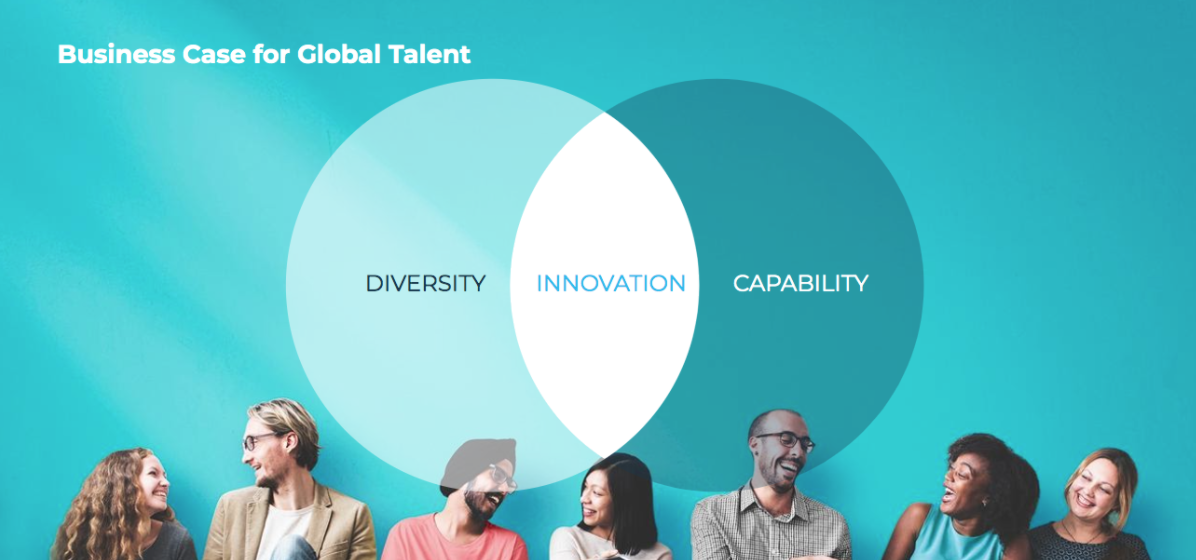TMA Managing Director and immigration thought leader Sarah Thapa says “visas” is not a dirty word and there needs to be a mindset shift in Australia around utilising global talent.
Having presented at many key industry events, drawing attention to how businesses could utilise global talent to fill immediate shortages in their industry, Sarah says there are still many industries that are conservative in their thinking about the world as a globalised talent market.
There is still a belief that Australia shouldn’t “import talent” and instead only hire locally. The idea of importing people is limited. It’s about diversity and innovation, and connecting companies to the best talent and enabling the transfer of skills and knowledge to customer markets.
At TMA, we believe Australian organisations can do both. Hiring locally and globally is the way the world is moving and it will only be amplified in 2022 as global mobility ramps up and we welcome back highly skilled global talent to fill our skills shortages.
We can no longer be sovereign in our approach to immigration and using global talent to recover the economy, increase diversity and fill skills gaps left by the pandemic. At TMA, we are all about bringing jobs and innovation to Australia for the benefit of our country and the businesses and people who live and work here.
What the post-covid labour market looks like
There are many organisations that look at talent from a global labour market perspective to help strengthen their own industries. These include the health, life sciences, technology and innovation sectors, among many others – and they are reaping rewards.
When international talent migrates to Australia, they not only bring their skills and knowledge, but also breakthrough innovations and cultural diversity, which is needed now more than ever with the labour market changing dramatically as a result of the covid pandemic.
What the post-covid labour market looks like:
- Lack of skilled workers: The Covid-19 pandemic caused by the exodus of migrants and low unemployment has resulted in major skills shortages in the Australian economy. Many organisations are realising that the best talent may not be found at their front doorstep, and organisations need to adopt a more international outlook to meet their need for skills and resources in the future.
- Globalisation of the talent market: The globalisation of the talent market has left global skills shortages across many industries, such as the health and life sciences sectors.
- War for Talent: Businesses are working harder to attract, retain, develop and engage talent to win the “War for Talent”. It’s become harder to attract and retain talent and prohibitive for many organisations to compete for talent.
- Low barriers to sourcing talent from overseas: Covid has significantly reduced the barriers to hiring internationally and companies are now embracing more agile and hybrid work practises, allowing them to hire anyone anywhere in the world. This is why growing the talent pool through global talent attraction is an essential part of building skills and capacity.
- More agility: Businesses now need to be agile, move and deploy people quickly to take advantage of post-Covid opportunities.
- Advancing technology: While technology is advancing at a rapid pace, all industries still need people “on the ground”.
The business case for global talent

Australia’s diversity is one of our greatest assets – it sparks innovation, creativity and vitality. Foreign talent can only help to transform Australia by reshaping the economy and diversifying our society.
Education and advocacy is important to us at TMA and why we need to change the rhetoric around global talent to see it as having a positive effect, rather than a negative one.
For example, the life sciences sector is strengthened by the skills, knowledge, linguistic capabilities and networks of a diverse workforce. Having the right capabilities combined with diversity are key drivers for innovation.
Inclusion of diverse talent is equally important and we encourage all industries and organisations to really think about how they can rethink talent acquisition and retention more strategically to embrace diversity and be more inclusive of global talent.
Organisations ahead of the curve are now incorporating a global talent strategy in their talent acquisition function.
Why diversity is an important driver for innovation
Having diversity in business and in teams creates a better outcome and Australia’s skilled visa program provides pathways for organisations looking to expand. Here are some of the options available to organisations who want to get ahead of the curve too:
- Global Talent Visa: For candidates with an internationally recognised record of achievement in their field.
- Temporary Work Visas: For professionals with skills in an occupation one of the list of eligible skilled occupations, for example, the Short Term Skilled Occupation List, Medium to Long Term Skills Shortage List, or the Regional Skilled Occupation List.
- Permanent Work Visas: For certain professionals with skills in an occupation on the Medium to Long Term Skills Shortage List.
- Independent / State Nominated Visas: Permanent residence visas available by invitation from a State or Territory Government based on local shortages.
Be part of the change
Be part of the impact that diversity and innovation are creating in Australia to strengthen our economy. Contact TMA today and learn how you can fill your skills shortages, stay ahead of the curve and incorporate a global talent strategy for your organisation.


